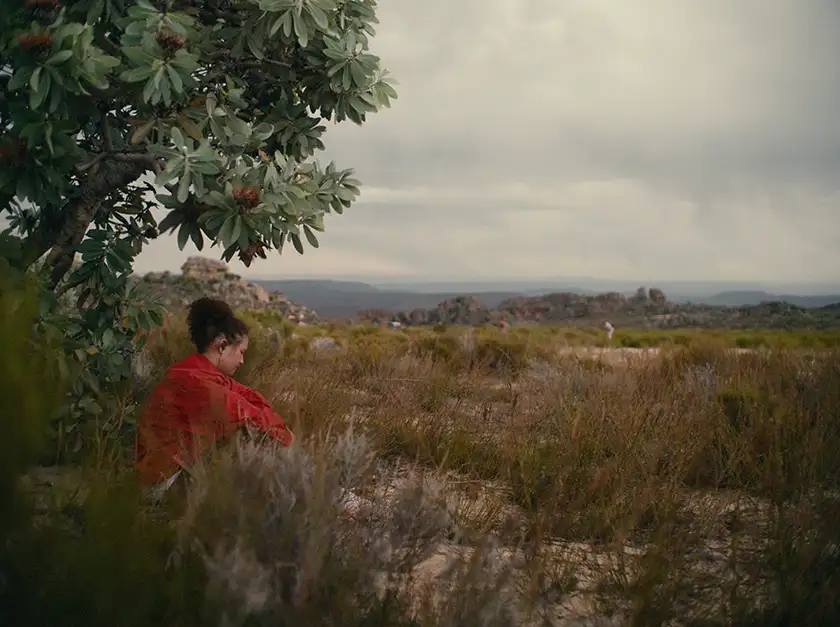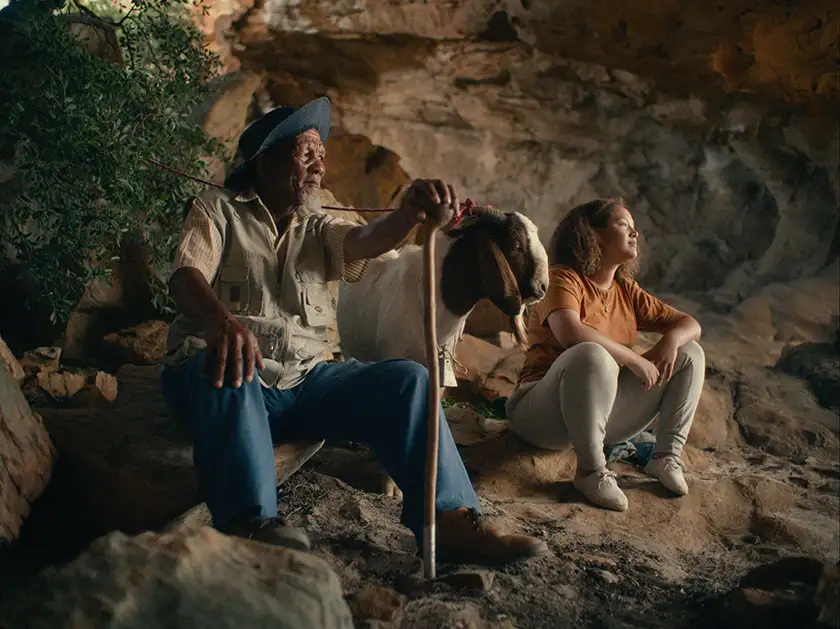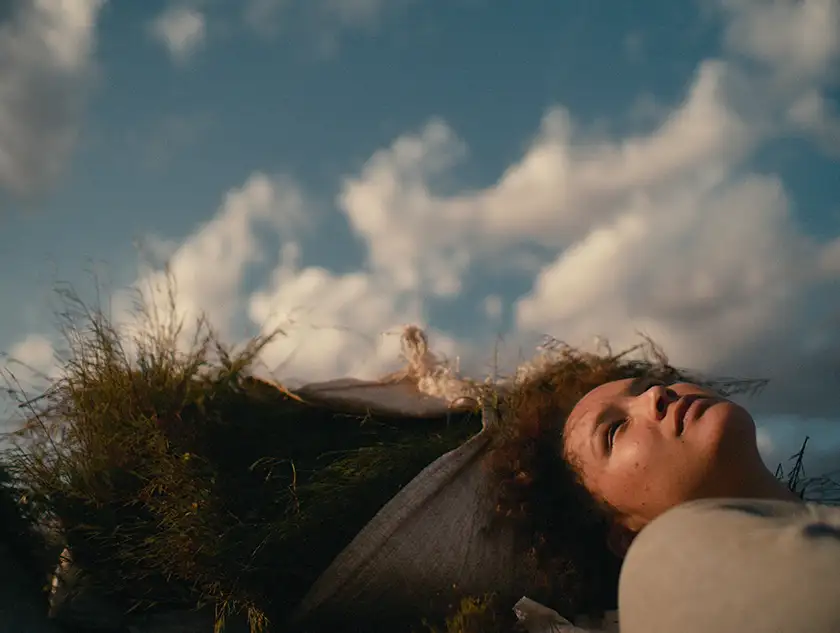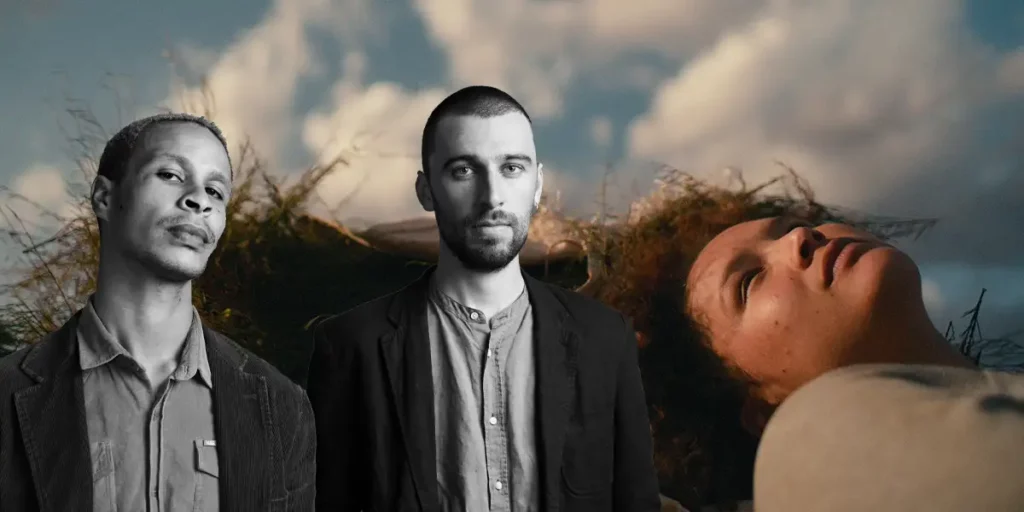At the Venice premiere of the film Carissa, we interview writers-directors Devon Delmar and Jason Jacobs about their stunning, impressive debut feature.
Carissa is a stunningly poignant film about finding purpose and second chances. It follows a young woman, Carissa (Gretchen Ramsden), struggling to find her place in the world whilst living in a remote village in South Africa. After she unexpectedly spends time on her estranged Grandfather’s rooibos farm, Carissa learns to connect with nature, with herself, and finds a new perspective on her responsibilities and her future.
The film has just premiered at the Venice Film Festival, where we sat down for an interview with writers-directors Devon Delmar and Jason Jacobs. We had a wonderful and inspiring chat about the filmmaking process, developing their cast and characters, and how the film evolved from an initial idea into being something very profound.
Devon Delmar & Jason Jacobs on Developing the Film’s Story & Script
Congratulations on Carissa! We thought the film was terrific. What was the development process like?
Jason Jacobs: The introduction to Devon [in 2018, by producer Deidré Jantjies] was a very important part of my own development as a human being. The reason I make films is to be challenged and to put the stories of my people on the map, and I think engaging with Devon in such a profound way has enabled me, and us both, to think bigger.
Devon Delmar: Jason and I took the original story idea in a completely different direction. The genesis of it evolved into something completely new, and the only thing that stayed the same was the town of Wupperthal [where the film was shot]. Our connection to that place has grown so much over the last six years, and we made very good friends in that community. It was one of the most beautiful things about the entire experience, deepening that connection with them, and so much of the town and the people in it are in the finished film.
J.J.: And Gretchen Ramsden [who plays Carissa] came on board quite early on in the process and assisted us with authentic storytelling. As Devon said, it was about spending time deepening our relationship with the community and deepening our understanding of the land. Meeting the people there and finding out how that connection could guide us through the process to a point when Carissa is being recognised after six years of development, has been realised in the most beautiful way.

It’s fantastic to hear that Gretchen was such a collaborative presence on the film, as were the people of Wupperthal. Were you concerned with hiring experienced actors or just finding the person who fit each role naturally?
J.J.: I definitely think it was the latter. I think what we found, and are learning with the more projects that we do, is that people here [in Wupperthal] are naturally gifted. They come from a history and lineage of storytellers.
D.D.: When we looked towards the community in terms of casting, it was a big, profound shift and the script changed in accordance. Because then we thought ‘okay, let’s write according to their existing conditions and their existing lives’. So we weren’t trying to be like a documentary, but by knowing everyone for so many years, we’d know what they’d be able to pull out of their character.
J.J.: Gretchen and Elton [Landrew, the actor who plays her father] are more experienced in terms of understanding set life, but everyone in the film brought different experiences. We learned that the nature of the film called for representation that was rooted in the community and in the land itself, and that that was quite a natural way of stepping into it. We never treated anyone inexperienced as less than. Everyone was treated exactly the same way, received the script in exactly the same way, and was challenged in exactly the same way. And through that sense of collaboration, we could create a project that speaks for itself.
D.D.: And in the end, actors like Wilhelmina [Hesselman, who plays Grandmother] is just such an incredible, natural born actor. Directing her was so much fun for us because she would just come at it with 1000%. She just went for it, no holding back, and she would respond to directions so well. You can’t teach that, it was phenomenal.
J.J.: Even the animals were fantastic to work with.
D.D.: [Laughs] Although sometimes tricky.
So the script clearly went through numerous iterations. What did you two particularly enjoy about that experience as writers?
J.J.: Writing with Devon was such a profound experience. I remember when we were in the middle of shooting and the power was out for the night, we saw some cars driving past and they created such an interesting light that we went and shot it the next day. Even in moments of just sitting with the community and thinking about the rest of the shoot, new things came up. You think you have a scene on paper, but then you get there and the circumstances give you something else, and it’s just a case of adapting to it.
D.D.: Going into it, because this is our first feature film, there was a sense that we would have a lot of control and the script would be shot exactly as it is. And then we realised the more we went through it, that we were just using the script as a vague idea of what would happen. We shot for 16 days, but by that 16th day we were like ‘okay, I know the scene should go in this direction’, but then we’d allow the environment to dictate to us what would happen. Things like the weather, or how everyone is feeling and the mood on set, or just what conversation we’d had the night before would all feed into the scene, which was a real revelation for me.

J.J.: And that was the big lesson that we learned as writers and directors, adapting to the environment that you’re given without freaking out and really trusting, working with, and honouring that as much as possible.
D.D.: It also felt a lot more natural and organic that way, rather than imposing a very strict blueprint onto every day to just see what’s there and let your canvas expand. It’s fun to just let things go.
Devon Delmar & Jason Jacobs on Forgoing Having a ‘Villain’ in Carissa
Carissa has such a tangible sense of place and a real sense of community. Was there ever a version of the film where the Golf Estate played a bigger, almost villainous, role?
Jason Jacobs: We had a version of the story where we were thinking of big budget ideas, like Carissa retaliating against the corporation coming in. But I think the story naturally progressed into just being about the character and the challenges that she faces. And the challenges that many of our young people face today, where they are being called to stay behind and make choices that are quite difficult for them. We never intended to put the Golf Estate in any bad light, because it’s opportunities and employment coming in.
Devon Delmar: We wanted it to be more impressionistic and suggestive than to really hammer down who the good and bad guys are. It doesn’t really exist in our world view of things, that sort of dichotomy. We didn’t want to make them out as simply antagonists because, as Jason said, they do represent employment. And there’s perhaps corruption within that system, coercion and abuse of the land, but people are struggling and need money. They need jobs. So we didn’t want to come down too hard on either argument.
So, in that sense, the film became much more intimate?
J.J.: Definitely. It’s about Carissa and family and the politics within the family, more so than it is an external outlook. And it’s exciting to trust the audience’s imagination and what they think could be happening. There’s such beauty in that.
D.D.: And I think it’s more interesting to present the two alternatives and just make it really hard for the viewer, instead of finding an easy target. Niekerk
J.J.: A scene that really stood out for me is when Carissa sits with her friend Gladwin [played by Gladwin van Nieker], and he says, “you shouldn’t f*ck this up for the rest of us”. I thought, oh my word, the pressure of having to be Carissa in that moment, of making a choice and having to decide ‘am I going to go back, or am I going to stay?’ And I thought it was so unfair to put that pressure on someone. That represents so many of us and the way we feel in our households, of being pushed to do something with our lives that isn’t really in the spirit of who we are. And for me that was quite profound.

Devon Delmar & Jason Jacobs on Some of Carissa’s Most Poignant Moments
One specific aspect of the film I wanted to ask about was the wind. It plays a subtle but very important part in the film. Was it used symbolically or were you just embracing the weather?
Jason Jacobs: We spoke so much about the wind as a life force, in that it’s giving and taking, and it has character and essence. It’s been important to us in all the work we have done, understanding the wind as a carrier of stories and a way of connecting with something bigger than yourself, connecting that to breath and how breath is a life giving force. And it’s also just very pretty, it’s very beautiful. [Laughs]
Some of the language in the film is also beautiful, in particular the quote “the mountains are wide open for you,” [as said by Hendrick Kriel as ‘Grandfather’] which really moved me. Can you elaborate on its origins, and its relevance to that final scene?
Devon Delmar: It was actually one of the things we found when subtitling it from Afrikaans, that we thought of maybe finding a more accurate English translation for, but you can’t translate it directly and I wouldn’t know how to put it into English in a better way. And to come back to that final shot of Carissa and the wind, even though she’s been confined back to her home space with the burden of taking care of her grandmother, there’s the sense that she has now discovered something about herself. The mountains are always there for you if you need them.
J.J.: And I think, for me, while there’s an invitation being presented to her by her Grandfather [to live on his farm], there’s also this invitation into the intelligence that is nature and the mountains. Nature gives you space and time to… I don’t want to use the words “find yourself”, but rather space and time to know that you are more than your circumstances and the confined space of your responsibilities.
D.D.: What we also wanted to do with that scene was to show her coping with all the duties she now has, like cooking for her father, washing the dishes, feeding her grandmother and going to the river to fetch water. Her life is being funneled down and the wind coming back is a reminder of the mountain and the vastness of the space that she still has access to. She hasn’t lost that connection. She’s grown and she hasn’t grown. We find her in the same place because we didn’t transform her into some sort of monk person. [Laughs] She’s still Carissa, she’s totally herself and more comfortable than maybe she was in the beginning, but the mountains are still there for her.
J.J.: That’s beautiful, Dev.
Devon Delmar & Jason Jacobs on Carissa premiering at Venice
It’s so exciting to have the film be a part of Venice! Are you going to get to experience any of the festival or just the premiere?
Jason Jacobs: This will be our second time back with a project, and we’re very excited to see our colleagues and our peers. I’ve been connecting with a few of the people in the Orizzonti programme and sharing the excitement there. Carissa is such an ancestral sent gift. Working with Devon, who dreams bigger than I’ve ever thought possible, is like finding the strength and the courage to jump over the mountain with each other. Venice is a testament to being able to dream big, to go for it, and know that it’s possible. When you work with that sense of trust and that level of faith, I think anything that comes your way can be taken with grace. I’m so humbled and honoured to be able to represent so many people who’ve come before us and will come after us on this platform. It’s very exciting.
We’re excited too. Thank you so much for speaking with us!
This interview was edited for length and clarity.
Carissa had its World Premiere at the Venice Film Festival on September 5, 2024.

